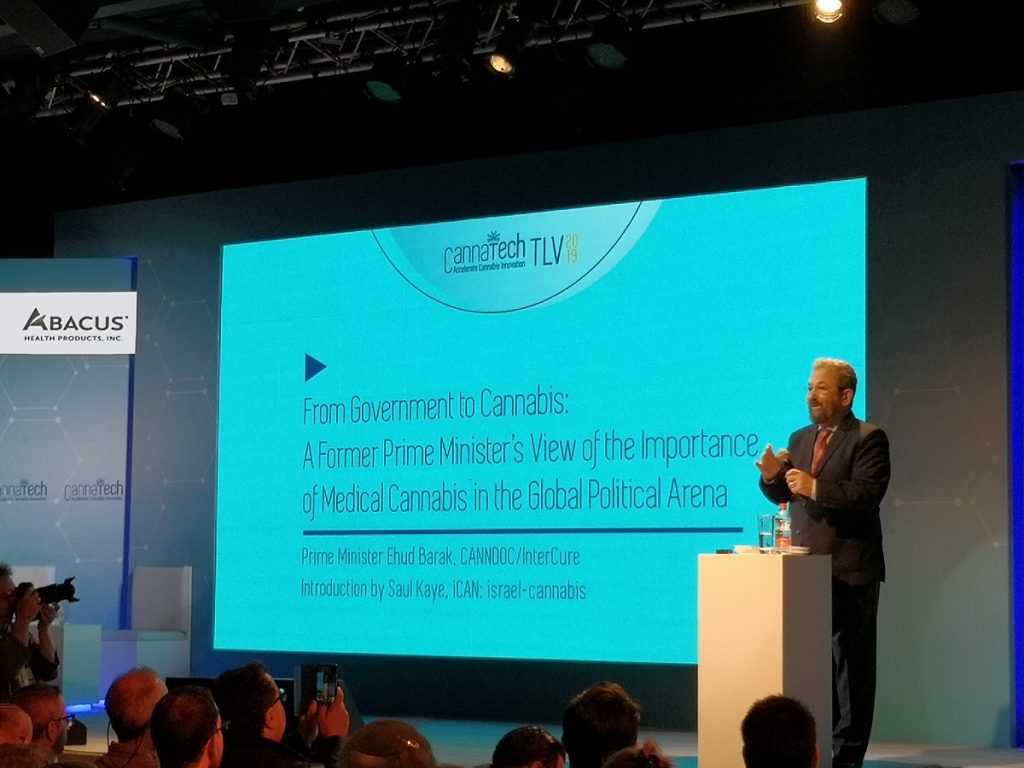Israel is the land of “milk, honey, and cannabis,” quipped former Israeli prime minister Ehud Barak at the annual CannaTech conference in Tel Aviv on Monday during his keynote speech. Barak was borrowing from the biblical phrase “a land flowing with milk and honey” in reference to the Promised Land in Jewish tradition.
The annual CannaTech event, focused on the medical cannabis sector, drew over 1,000 participants from some 45 countries this year, gathering professionals and entrepreneurs from fields such as pharmaceuticals, biotechnology, agriculture, medicine, and business, for a three-day summit meant to highlight the latest developments in the burgeoning industry, and in which Israel plays a major role.
Barak, Israel’s most highly decorated soldier and the IDF’s longest-serving chief of staff who went on to become prime minister in 1999-2001, is one of the local industry’s most high-profile newcomers, having recently assumed the role of chairman of the board of the Israeli medical cannabis company Canndoc/Intercure.
Barak has had a hand in vibrant tech ecosystem for years, investing, founding, and chairing a number of startups in the sphere of cybersecurity, rescue technology, and biometrics, but his medical cannabis venture has grabbed the most attention both locally and internationally. A little over a month after he took on the chairman role, the share price of Canndoc/Intercure rose 900 percent and its value doubled. With that, Barak’s stock options are currently estimated to be worth about $9 million, making him one of the Israeli medical cannabis industry’s biggest players.
At CannaTech on Monday, Barak was a minor celebrity and his address was widely attended.
The former statesman spoke with conviction of the positive effects on the lives of those who need cannabis for medicinal purposes, and his belief that Israel is playing an essential role in the push for the global decriminalization of the substance.
However, any suspicions or expectations that Barak may have occasionally dabbled in the enjoyable effects of THC were crushed outright. Speaking like a true politician, Barak said he “never inhaled a single breath of cannabis, never exhaled it, [and] never put it under [my] tongue.”
“But I happen to be the chairman of Canndoc, which is now moving forcefully into the medical or pharma grade arena in Israel, ready to seize the opportunities of export and move on globally. That’s the reason I am here,” he added.
Barak estimated that the cannabis market was now at $17 billion worldwide and would grow to some $150 billion in the coming years. He predicted that in the not so far future, one out of three people on the planet would be using some kind of cannabinoid-based product and suggested the huge industry opportunities in both the medical and recreational fields should be seized “aggressively and immediately.”
In the United States, he said, we now have [a situation where] two-thirds of the states approved medical cannabis of certain types, and a third even [approved] recreational use, and I really predict that within the next 3-5 years, the federal authorities in the US will legalize it on a very wide scale.”
“We are at the lower inflection point of the s-scale of growth of the cannabis industry and we will face in the coming several years, exponential inflation of the volume size and the tonnage of products both for recreational and medical use. In 10 years, the present formal or legal market, which is about $17 billion – about 45 percent medical [and] 55 percent recreational, will develop into $50 billion, probably $150 billion, probably more; no one can seriously try to predict,” he went on.
Sign up for our free weekly newsletter
SubscribeBarak said that it was the role of the “actual players in Israel, in Canada, in Europe, in Australia and elsewhere,” to develop scalable, quality products. The vision for the industry, he said, is to produce highly accurate dosages of the healing components found in cannabis, and to then normalize and popularize the use of pharmaceutical cannabis products in as many markets as possible.
“We will find more and more combinations [of active ingredients] that have a tangible impact on patients, […] help people to enjoy a better quality of life, but also to find some cure or major remission,” he said.
Currently, using cannabis for its medical benefits is “more an art than a science,” he explained, with a process that heavily depends on trial and error, as reactions vary. Even doctors need to be trained anew on how to treat their patients with cannabinoid products. It is this inaccuracy that is currently keeping governments and policy makers from moving faster towards legalizing medical cannabis, as no one dares to enter a field that only allows for modest predictions and where high levels of uncertainty need to be accepted as a given, Barak said.
With Canada and Germany legalizing medical use however, hopes are high that other states will soon follow suit and open up vast markets for Israel.
“The UK will follow in Europe, then probably France and Italy and then the cascade will go very fast,” Barak predicted.
As a pioneer in research of medical applications, and a leader in cutting-edge farming technology, Israel definitely has an edge when it comes to supplying all those markets with cannabis, he said.
Startups and companies in the industry should focus on three major areas, in which Israel thrives, according to Barak: good collaboration agreements with the European Union, good access to the Far East, India and China, and a deep and intimate relationship with Canada, the pioneer of legalized medical cannabis use.
“We live in a fascinating period, a huge opportunity to be seized aggressively and immediately,” Barak concluded in his address which was frequently being interrupted by enthusiastic applause.
“There will be ups and downs, many players will disappear. There will be overlaps with other industries, like beverages, vaping or even the food industry, and of course we will have to check for negative impacts and make sure that we know what we are doing. But I am very optimistic that we are in an extremely fast-developing arena, and I wish all of us big success.”
Related posts

Israeli Medical Technologies That Could Change The World

Harnessing Our Own Bodies For Side Effect-Free Weight Loss

Missing Protein Could Unlock Treatment For Aggressive Lung Cancer







Facebook comments